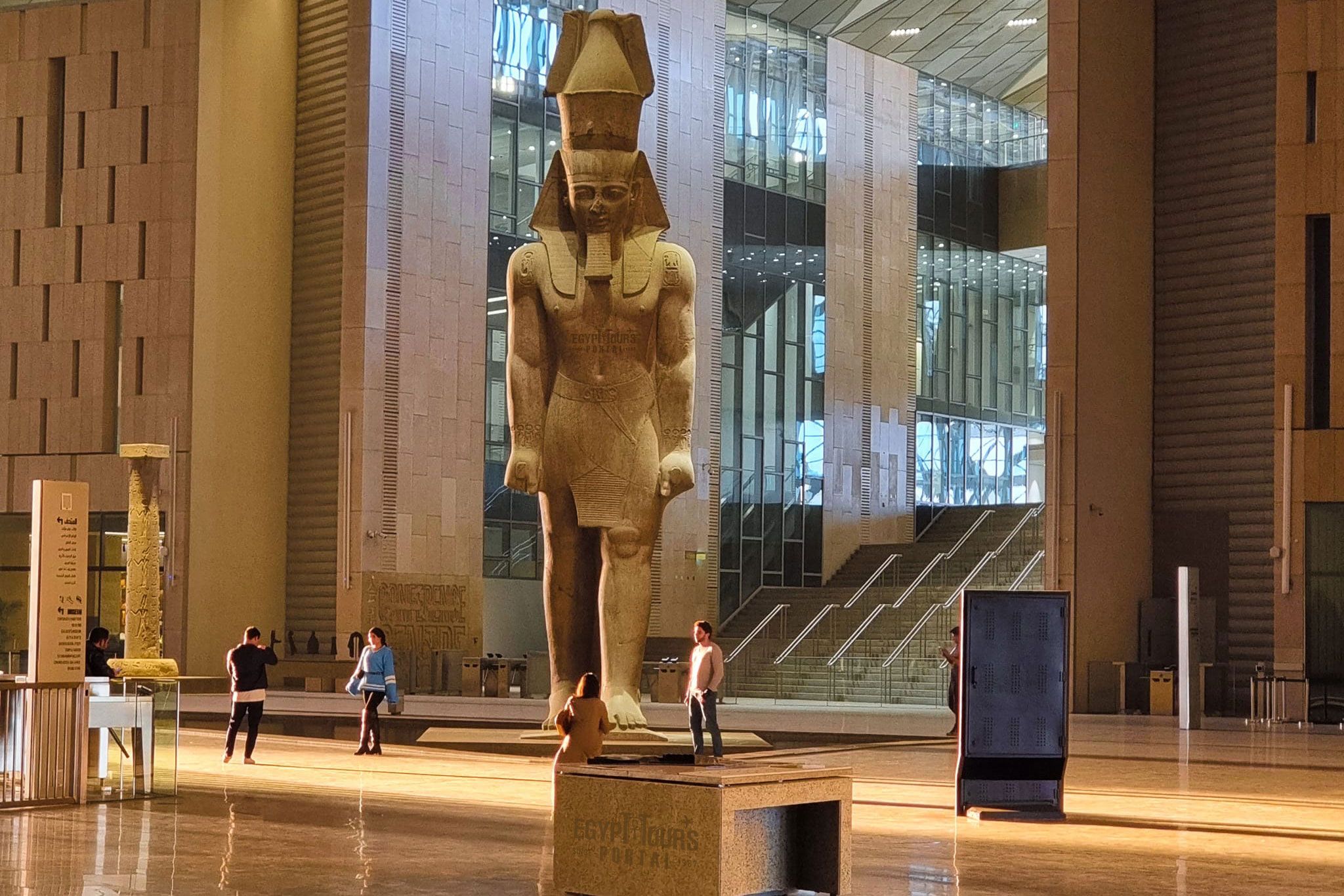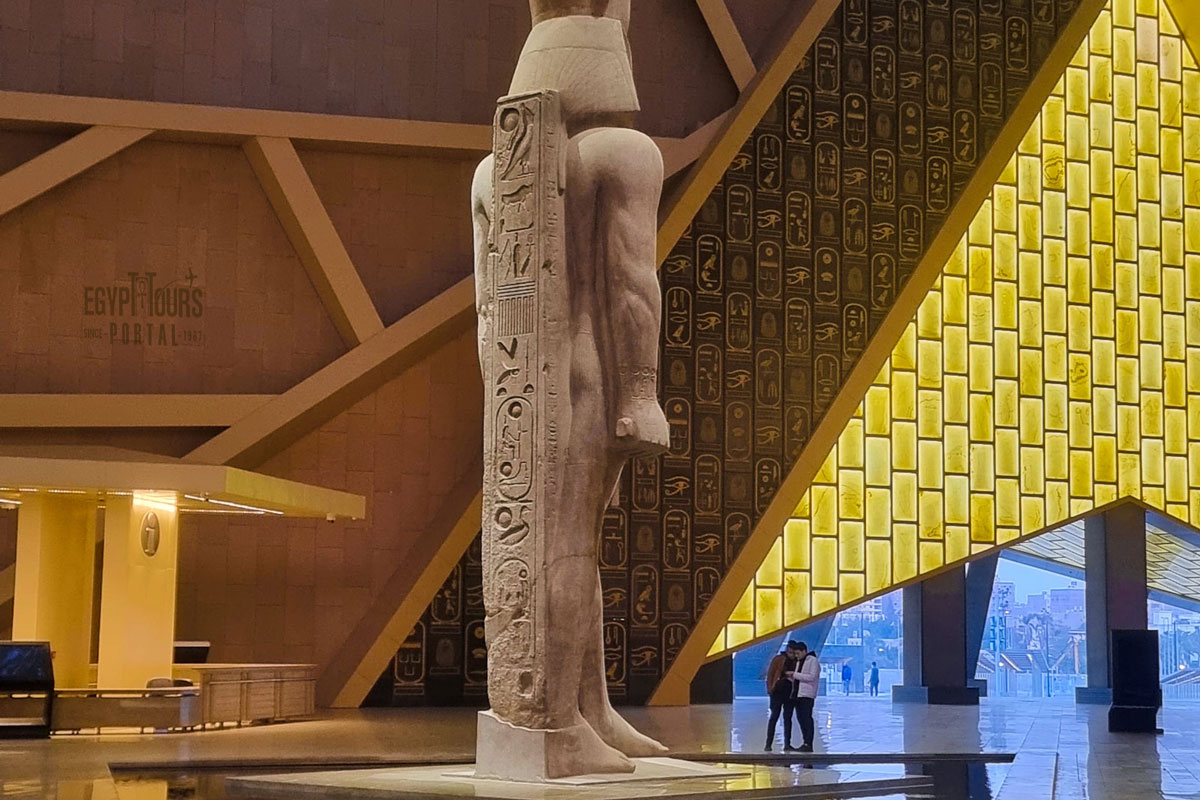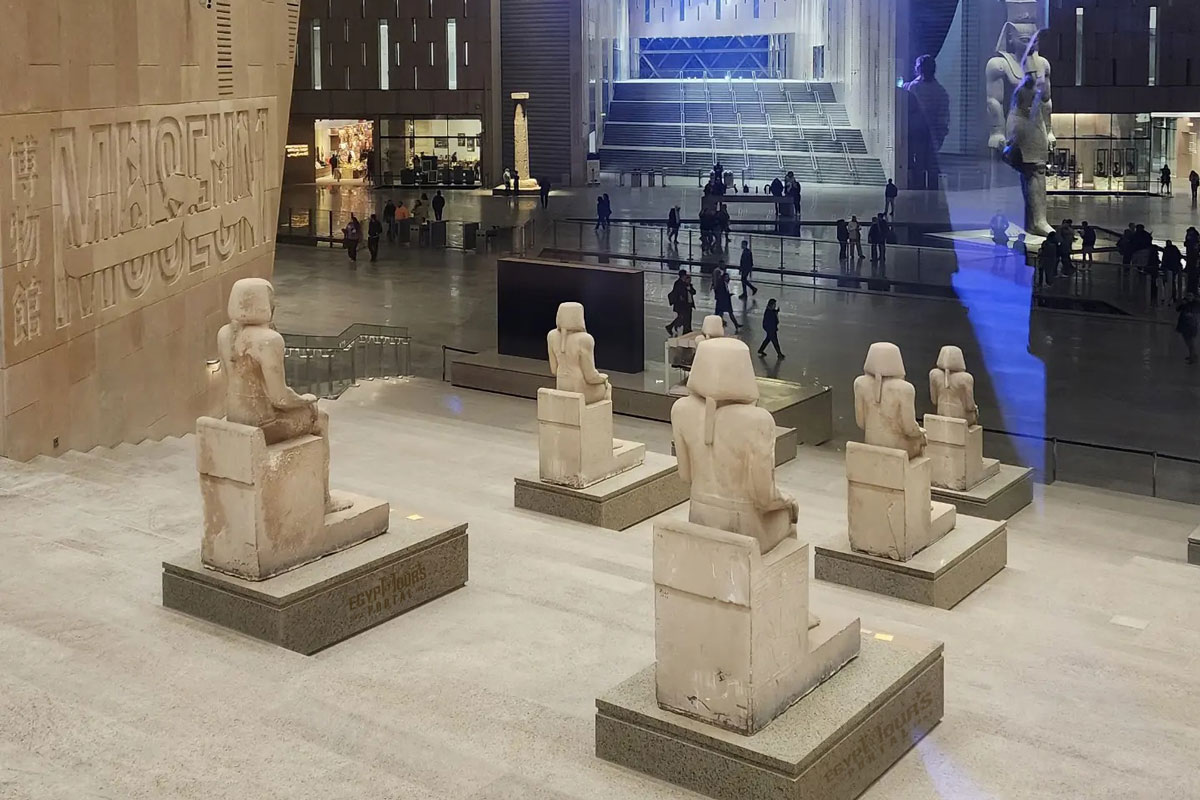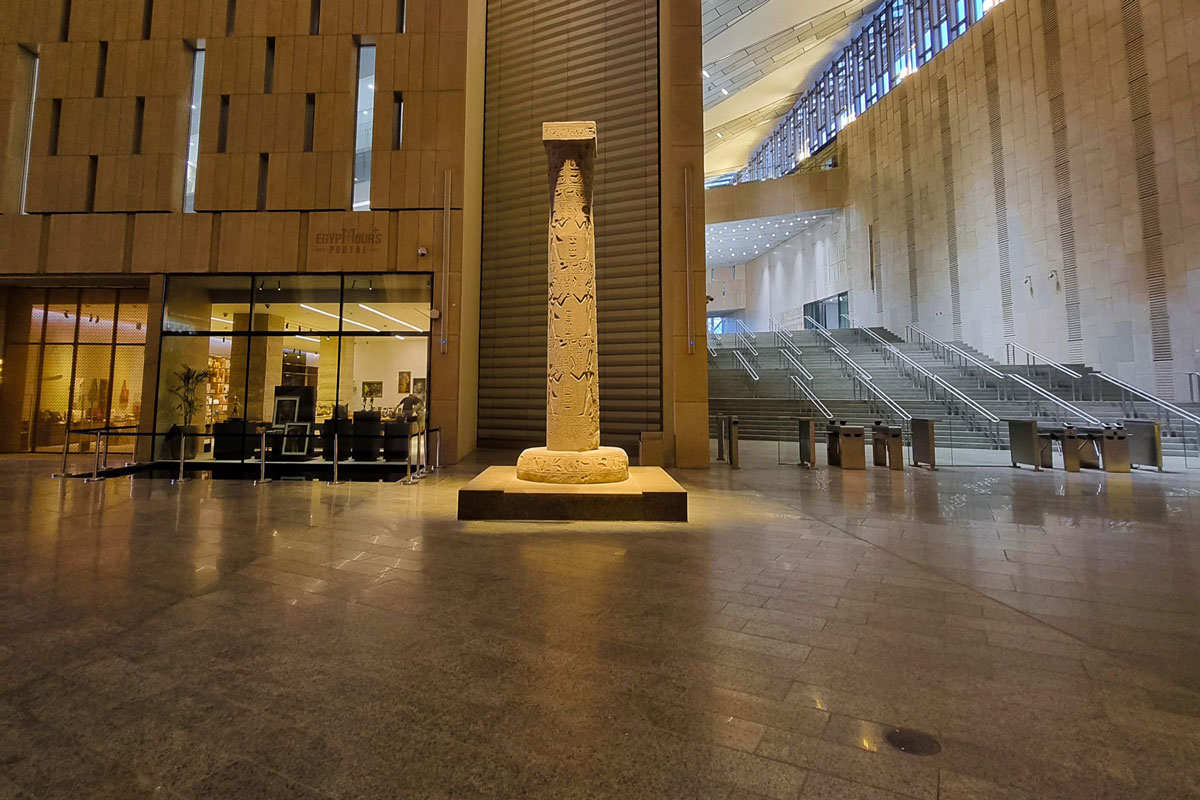- Local Time: 12:11 AM
- Weather: 30 ℃ / 87 ℉

The Grand Egyptian Museum (GEM) is a realm of divine creations made of pure magic and wonder that displays artistic awakings, mythological beliefs, and historical progress. It is a planned museum of ancient Egypt artifacts, a means to ensure these treasures will be able to survive for various generations to come.
Described as the largest archaeological museum in the world able to sustain 5 million visitors a year, the museum is under construction and is scheduled to be partially open in 2023, exhibiting the full King Tutankhamun collection with various pieces to be displayed for the first time ever. The cost of the museum is one billion dollars, which is mostly financed by two loans from the Japanese government in the total amount of 300 million dollars.

The design of the building was decided by means of an architectural competition just like the great library of Alexandria. The competition was announced on 7 January 2002 by the organizers who received 1557 entries from 82 countries which makes it the second-largest architectural competition in history. In the second stage of the competition, exactly 20 entries were asked to submit additional information about their design. Judging was completed by 2 June 2003. The company Heneghan Peng from Dublin, Ireland won the competition winning 250,000 dollars, and the chance to witness their design comes to life.
The structure of the gem museum was built by the Belgian company BESIX which founded a joint venture with Orascom Construction (OC) as the official contractor for the cost of $810 million. The architects Róisín Heneghan and Shi-Fu Peng who created the Irish company Heneghan Peng were hired as the main architect. The main Structural engineer was Arup and the Services engineer was Buro Happold. To witness the milestones of the gem everyone can book our incredible Egypt tours.
The Grand Egyptian Museum is found close proximity to the Giza pyramids complex "2 Kilometer northwest" and is just 15 kilometers away from Cairo which is just a few minutes by car.

The design of the museum utilizes the level difference to construct a new "Edge" to the plateau, a surface defined by a veil of translucent stone that magically transforms from day to tonight. The museum exists between the level of the Nile River and the plateau, never extending above the whole plateau. It sits on a site 2 km west of the Giza pyramids, and funerary monuments near a motorway interchange. The building's north and south walls line up perfectly with the Great Pyramid of Khufu and the Pyramid of Menkaure.
- The Grand Egyptian museum is designed to include the latest advanced technology, such as virtual reality, virtual augmentation, interactive exhibits, 3D models, and more.
- The museum will also be an international center of communication between other museums, to promote direct contact with other local and international museums.
- It holds 122 highly advanced displays designed by an Italian company "Goppion" to offer ideal protection to all the organic, artistic, and fragile artifacts.
- It holds the 3200 years old, 82 tons statue of Ramsess the great within ts atrium and there is a hall dedicated to the Solar boat of King Khufu; both were transported from the Giza Complex.
- The Grand Egyptian Museum will contain a children's museum, conference center, training center, and workshops similar to the old Pharaonic places.
- One of the most important areas in the museum will be the restoration center which is on a space of 32 thousand meters, 10 meters underground, and connected by a 300 m tunnel to the museum for transporting the artifacts after restoration.
- There are about 19 laboratories that will handle all types of preserving and restoring ancient Egyptian artifacts such as a vase, glass, and metal lab which of course handles all artifacts, vessels, or statues made from non-organic substances.
- A wood lab that handles all the restoration of an artifact made out of wood like covens, statues, funerary objects, tools, ships, and sarcophagi.
- A stone lab which of course takes care of all the statues on display from the colossal to the smallest ones.
- Microbiological lab protects the artifacts by discovering the types of living creatures that could cause the destruction of the artifacts which the researchers eliminate by creating a chemical matter that will stop the progress of this life form from hurting the artifact.
- A microscope scanner lab that holds all the tools needed for preparing and examining the samples before sending them to the microbiological lab.
- A Human remains lab "Mummies Lab" is responsible for restoring all the ancient Egyptian mummies of all the kings, queens, workers, and even animals like cats & birds.
- The exterior design of the museum is intended to be a modern interpretation of classic Egyptian architecture, while also being environmentally sustainable. Here are some of the key features of the exterior design:
The museum's main building is shaped like a triangular pyramid, with a sloping roof that rises to a height of around 50 meters. The pyramid shape is an homage to the ancient pyramids of Egypt, which have become a symbol of the country's rich cultural heritage. The exterior of the museum is clad in a high-performance glass façade, which allows natural light to flood the interior of the building. The glass also helps to regulate the temperature inside the museum, reducing the need for artificial cooling. It is decorated with laser-cut limestone across its epic exterior.
The museum's roof is covered in solar panels, which generate renewable energy to power the building's lighting and other electrical systems. The solar panels are arranged in a way that mimics the pattern of the Nile River delta, further emphasizing the connection between the museum and Egypt's natural environment. Its grounds feature a series of gardens and landscaped areas which help to cool the surrounding environment and promote biodiversity. The gardens also include a number of native Egyptian plants, which provide a connection to the country's natural heritage.

The Grand Egyptian Museum is on 480,000 square meters (5,200,000 sq ft) which a floor area of 81,000 square meters (870,000 sq ft) approximately 2 km (1.2 miles) northwest of the Giza pyramids, 15 km from Cairo and is part of a new master plan for the plateau. In front of the building is a large plaza, filled with many date plants. One of the main features of the museum is the translucent stone wall, made of pure alabaster, which makes up the front facade of the building. Inside the main entrance of the museum is a large atrium, where large statues will be exhibited. The Grand Egyptian Museum is foreseen as a cultural complex of activities devoted to Egyptology as it will contain 24,000m² of permanent exhibition space, almost 4 football fields in size, a children’s museum, a larger conference center, and education facilities, plus extensive gardens on the 50h A site.
The actual work began on 2 February 2010 when Hill International announced that Egypt's Ministry of Culture had signed a contract with a joint venture of Hill and EHAF Consulting Engineers to provide project management services during the period of design and construction of the Grand Egyptian Museum.

On 5 January 2002, Egyptian ousted President Hosni Mubarak laid the foundation stone of the Grand Egyptian Museum. On 25 August 2006, the Statue of King Ramesses II was moved from Ramses Square to the Giza Plateau in Cairo, in anticipation of the construction of the Grand Egyptian Museum. The Statue of Ramesses II is estimated to be about 3,200 years old and was moved to the entrance of the museum in January 2018.
In 2007, GEM secured a $300 million loan from the Japan Bank for International Cooperation. The Egyptian Government will fund $147 million while the remaining funds were secured through donations and international organizations.
On 11 January 2012, a joint venture between Egypt's Orascom Construction Industries (OCI) and the Belgian BESIX Group began as it was awarded the contract for phase three of the Grand Egyptian Museum (GEM), a deal valued at $810 million bringing the total cost of the museum to $1.1 billion.
On 29 April 2018, a fire broke out near the entrance of the GEM but artifacts were not damaged and the cause of the fire still remains unknown.
In May 2018, the last of King Tutankhamun's chariots were moved to GEM from overseas.
In November 2018, the estimate for a full official opening was set for late 2023, according to Tarek Tawfik, GEM’s director.
In early 2023, The gem museum announced a number of tours leading to some of the displays during the soft opening.

There are 4-time slots available in the soft opening which are open every single day. Everyone will explore the gem in a two-hour exploration session from 10 am — 12 pm — 2 pm — 4 pm. There is a light show that takes place at 6 pm after sunset. In order to book a trip to the Grand Egyptian Museum, Then everyone should contact the team of Egypt Tours Portal at any time.
| Price of the GEM for Egyptian Adult | 150 LE |
| Price of the GEM for Child/Student | 75 LE |
| Price of the GEM for Foreign Adult | 1000 LE |
| Price of the GEM for Foreign Child/Student | 500 LE |
| Price of the VIP GEM Tour | 2000 USD - Two Thousand Dollars |
| Price of the GEM Light Show for the Young | 2500 LE |
| Price of the GEM Light Show for the Adult | 4500 LE |

The museum will cover about one-third of the total museum grounds displaying more than 100,000 artifacts from various periods, some of which have never been seen before. The main attraction of the museum will be the first exhibition of the full tomb collection of King Tutankhamun which will showcase about 5000 items in total and will be relocated from the Egyptian Museum in Cairo. Other artifacts will be relocated from storages and museums in Luxor like the great statue of Amenhotep III and four tons pink Granite statue of the god Horus, Aswan, Minya, Sohag, Assiut, Beni Suef, Fayoum, the Delta, and Alexandria.
During the limited tour of the soft opening, everyone will cast their eyes on the following which include:
Check out our Egypt private tours and book your dream vacation to Egypt to explore what Egypt has to offer and the Gand Egyptian Museum, also we offer Nile river cruises to check them if you prefer.
Private 4 Days Cairo Tour Packages for British Travelers 4 days Cairo Egypt Tour package will shed ligh...
5 Days Cairo and Alexandria Tour Package For British Travelers 5 days Cairo and Alexandria tour package ...
6 Days Cairo, Luxor & Aswan Tour Package For British Travelers 6 days Cairo, Luxor & Aswan tour ...
Amazing 7 Days Cairo and Hurghada Holiday for British Travelers 7 Days Cairo & Hurghada tour package...
Egypt Tours Portal prides itself on being the best travel agency in Egypt as proven by our numerous positive reviews.
This review is a late, but I had to provide some feedback. My brother and I went on vacation in October 2022 and booked with Egypt Tours Portal. With on-line sc...Read More
My fiancé and I booked a private 5 day tour of Egypt with ETP starting in Cairo followed by Aswan, Abu Simbel and Luxor. We just got home and continue to talk ...Read More
This was the trip of a lifetime that I was able to have with my eldest son - an absolutely amazing experience. To be able to actually see the places and artifac...Read More
Highly recommend this tour company!!! Our guides, Moses, Mahmoud, Magred and Mohamed were exceptional, their knowledge of the history is more that accurate, the...Read More
Egypt Tours Portal is an excellent company to use to arrange your visit to Egypt. They work with phenomenal guides (we had Mahmoud Nour in Upper Egypt and Mohse...Read More
It was an absolutely amazing trip where we saw some of the most historical and beautiful sights in Egypt. Our tour guide Mohamed Elshemei was extremely knowledg...Read More








